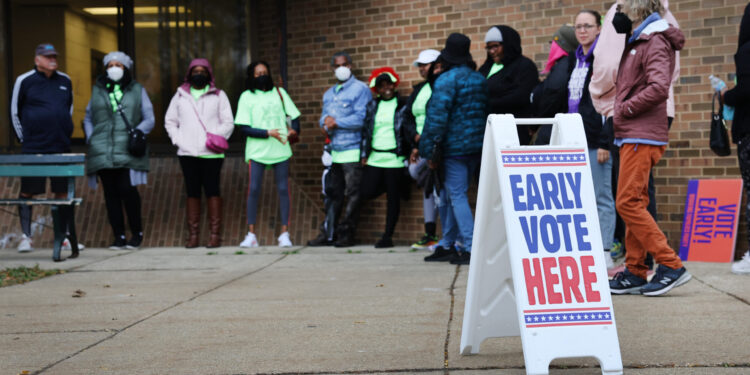A top Milwaukee elections official has been fired for alleged fraud in what may have been a stunt to spotlight how easy fake military ballots can be trafficked in Wisconsin, authorities said.
Kimberly Zapata, 44, was fired as deputy director of the city’s Election Commission after she allegedly had unsolicited military ballots sent to a state representative’s home. Milwaukee Mayor Cavalier Johnson said the case is under investigation but may have been a bid to expose how easily the election system can be exploited.
“This has every appearance of being an egregious blatant violation of trust [and] this matter is now in the hands of law enforcement,” Johnson said, according to WISN.
“It does not matter to me that the alleged crime did not take place at work,” he added. “It does not matter to me that the city of Milwaukee ballots were not a part of this, nor does it matter that there was no attempt to vote illegally or tamper with any election results.”
The drama came less than a week before Wisconsin voters go to the polls to select a governor and senator, among other races. Zapata could face a felony charge of malfeasance in office and a misdemeanor charge of illegally requesting a ballot, a source told the Milwaukee Journal Sentinel.
Zapata’s attorney, Michael Maistelman, declined to answer questions about his client’s alleged actions.
“We will litigate this in the courtroom, not the media,” Maistelman told the Milwaukee Journal Sentinel.
The alleged caper came to light earlier this week when state Rep. Janel Brandtjen posted on social media photos of three military absentee ballots sent to her home on Oct. 27. Brandtjen said the ballots appeared to be sent from clerks in Menomonee Falls, South Milwaukee and Shorewood and were each addressed to a fictitious “Holly” with three different last names.
Wisconsin state Rep. Janel Brandtjen posted photos of military absentee ballots sent to her home on Oct.27. (Office of Rep. Janel Brandtjen)
Brandtjen, a Republican and chair of the Assembly Elections Committee, said she also suspects someone, possibly Zapata, was trying to prove a point.
“I believe someone was trying to point out how easy it is to get military ballots in Wisconsin,” she said. “Registration for military ballots is not required, so a fictitious name and birthdate is all that is required to obtain a military ballot online.”
Under state law, military voters are not required to register to vote and do not have to provide photo ID or any other identification. Milwaukee Election Commission chief Claire Woodall-Vogg said Zapata was likely trying to show Brandtjen the system’s vulnerability.
Milwaukee Elections Chief Claire Woodall-Vogg (above) said Zapata was likely trying to show Brandtjen the system’s vulnerability. (Milwaukee Election Commission)
“It’s my belief that she was pointing out that you can go onto the public system, make up a person and request a ballot,” Woodall-Vogg said.
In August, a Racine man was accused of using the state’s MyVote system to fraudulently request absentee ballots in the names of Assembly Speaker Robin Vos and Racine Mayor Cory Mason in order to show flaws in the system. Harry Wait, a leader of a Racine County-based group known as H.O.T. Government, was praised for the action by Republican Sen. Ron Johnson, who called him a “white hat hacker” for “trying to show a vulnerability” in the system overseen by the Wisconsin Elections Commission.











